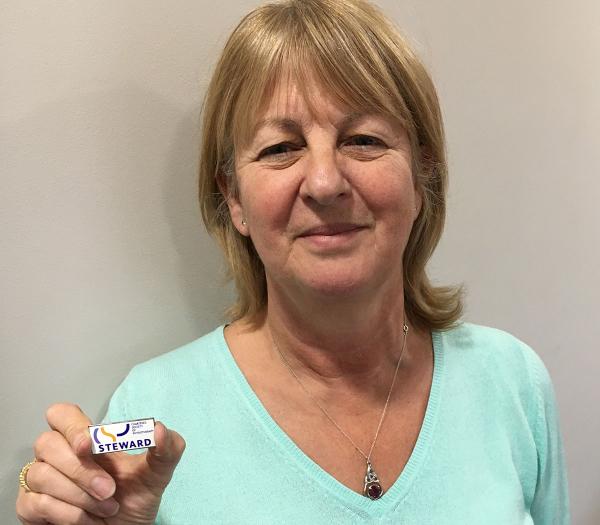Ask not what your union can do for you, but what you can do with your union.
Barbara Duffy has just become a CSP steward, here she talks about what made her take on the role.

Barbara Duffy has only been a CSP steward for a fortnight!
Last week she went on a training course for CSP stewards which she described as ‘hands-on’ and ‘in-depth’.
In her varied career Barbara has worked in the supplies office and the contact centre of the Morecombe Bay Trust. Two years ago she became a physiotherapy technical instructor at the Royal Lancaster Infirmary.
‘I’m more of a people-person and I wanted a more hands-on role with the patients.’
Barbara and the other technical instructors rotate wards and she’s worked in rehabilitation, orthopedics, general surgery and stroke.
‘Our work is varied day to day, assisting the registered physiotherapist. We can mobilise when a patient only requires one person to get them up.’
Barbara has been a member of other unions prior to joining the CSP.
‘For people like myself it’s very important that you’re in a union. Registered physios are more likely to be CSP members but because of the nature of being a physio instructor or assistant you might change job roles.’
The CSP is known for providing a good service to the registered members of staff, Barbara said, and highlighted as a benefit the training for technical instructors the CSP offered along with legal/liability cover.
‘It’s no more expensive to be a member of CSP than any other union. There’s a fantastic team behind you at the CSP of people you can get hold of when you need to which is important. Some organisations are so large it’s not always easy to get someone local. It seems staff are always available.’
A lot of people aren’t in a union because they haven’t been asked for one reason or another, Barbara said.
‘You are safeguarding yourself by being in the union. You just don’t know what might happen and you need the help and support from a steward. It’s nice to know that you have a shoulder to lean on.’



































